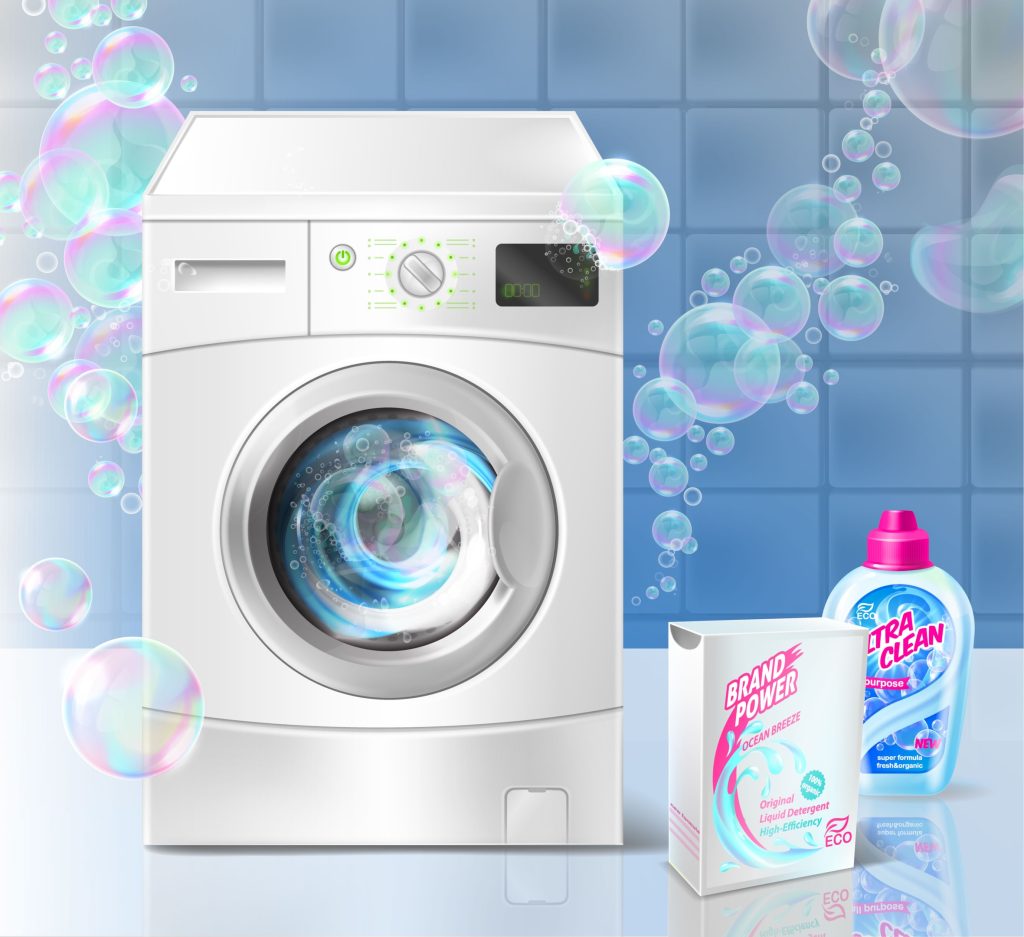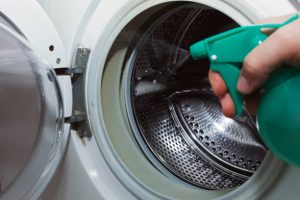Washing Machine Smells: Common Causes and Easy Fixes

A smelly washing machine is a common household problem that can make your freshly washed clothes smell less than fresh.
Unpleasant odors often originate from residue buildup, moisture, or bacteria in the washer drum, detergent dispenser, or rubber gasket. Left unaddressed, these issues can lead to a frustrating laundry experience.
Fortunately, with the right cleaning techniques and preventive measures, you can restore your washing machine and prevent odors from returning.
This comprehensive guide will explore the causes of washing machine smells, the cleaning process, and tips for maintaining a fresh-smelling machine.
Why Does My Washing Machine Smell Bad?
A combination of factors typically causes odors in washing machines:
- Detergent Residue: Using too much detergent or the wrong type can cause soap scum to build up in the drum, hoses, and dispensers.
- Fabric Softener Residue: Overusing fabric softener leaves behind a sticky film that traps bacteria and dirt.
- Moist Environment: The washer’s drum, particularly in front loaders, retains moisture, creating an ideal environment for bacteria and mold.
- Clogs in the Washing Machine Drain: A blocked drain can cause water to stagnate, resulting in a rotten egg smell.
Front-Load vs. Top-Load Washing Machines
Front Loaders
Front loaders are efficient and use less water, but their design makes them more prone to odors. The rubber gasket around the washer door traps moisture and debris, leading to bacterial growth and unpleasant odors.
Top Load Washers
Top loaders have better natural air circulation, which helps prevent mold and mildew. However, they are not immune to detergent buildup and clogs in the detergent dispenser.
How to Clean a Smelly Washing Machine: Front Loader
Cleaning a front loader requires attention to areas where dirt and bacteria can accumulate. Here’s a step-by-step guide:
- Empty the Washer: Start with an empty washer drum. Remove any lingering wet clothes that may contribute to the odor.
- Clean the Rubber Gasket: The rubber gasket is a prime location for dirt, hair, and detergent residue. Wear rubber gloves and wipe it down with a baking soda and warm water solution. For stubborn grime, use an old toothbrush to scrub the folds.
- Remove and Clean the Detergent Drawer: Remove the detergent dispenser and scrub it thoroughly with baking soda and distilled white vinegar to eliminate residue. Rinse with hot water to remove any lingering cleaning agents.
- Run a Cleaning Cycle: Add 1 cup of baking soda and 2 cups of white vinegar to the drum. Run a service wash on the hottest setting. This helps break down detergent residue and eliminates odors.
- Inspect and Clean the Washing Machine Drain: Check the washing machine drain for clogs. A blocked drain can trap water and cause odors. Clear any debris and flush with hot water.
- Leave the Door Open: Keep the washer door open for air circulation and drying after cleaning.
How to Clean a Smelly Washing Machine: Top Loader
Cleaning a top loader is slightly different due to its vertical design. Here’s how to do it:
- Prepare the Drum: Remove all clothes and debris from the drum. Inspect for leftover lint or dirt.
- Run a Cleaning Cycle: Pour 1 cup of baking soda and 2 cups of distilled white vinegar into the drum. Run a full cleaning cycle with hot water to break down soap scum and detergent buildup.
- Scrub the Drum: Use a damp cloth and a baking soda solution to scrub the drum and eliminate any remaining residue.
- To clean the Detergent Dispenser, Remove the drawer and soak it in warm water and chlorine bleach to dissolve the detergent residue and grime.
- Check the Drain Pipe: Inspect the drain pipe for blockages and flush it with hot water to ensure proper drainage.
- Dry the Washer: Wipe down all surfaces with a clean towel and open the lid to promote drying.
Remove and Scrub the Detergent Dispensers
The detergent dispenser is a common source of odors due to detergent buildup and trapped moisture. Remove the dispenser and scrub it thoroughly using a mixture of baking soda and white vinegar. Ensure all nooks and crannies are cleaned to prevent future odors.
Use the Right Kind (and Right Amount) of Detergent and Fabric Softener
Too much detergent or fabric softener is a recipe for detergent residue and sticky buildup. Follow these tips:
- Use high-efficiency detergent in high-efficiency washing machines.
- Avoid excessive fabric softener, which can coat the drum and hoses.
- Read the manufacturer’s guidelines to determine the correct quantity for each wash cycle.
Deep Cleaning to Eliminate Persistent Washing Machine Smells
When dealing with stubborn odors in your washer, a thorough cleaning that addresses all potential problem areas is essential. Focusing on areas like the rubber seal, drum, and internal components can eliminate foul smells and restore freshness.
Step-by-Step Deep Cleaning Process
1. Inspect and Clean the Rubber Seal
The rubber seal in front loaders is a common culprit for odors. Dirt, soap scum, and moisture can accumulate in the folds, leading to bacteria buildup. Use a cleaning solution of warm water, vinegar, or baking soda to scrub the seal thoroughly. Be sure to wear gloves and remove any visible debris.
2. Run a Complete Cleaning Cycle
A complete cycle with the right cleaning agents can work wonders for a smelly washer:
- Add 2 cups of white vinegar to the drum.
- Use the tub fill option (if available) or the largest load setting.
- Run the washer on the hottest water temperature to dissolve buildup and sanitize.
3. Address the Remaining Vinegar Smell
Some people notice a lingering vinegar smell after running the vinegar cycle. Run another complete cycle with a cup of baking soda to neutralize this. This step helps deodorize the washer and leaves it smelling fresh.
4. Dry the Washer Overnight
Keep the washer door open to prevent moisture from lingering. Then, allow the drum to dry fully overnight. This will prevent future mold or mildew growth and promote better air circulation.
5. Prevent Future Odors
Regular maintenance can prevent the smell from persisting:
- Use high-quality detergent in appropriate amounts to avoid residue.
- Wipe the drum and rubber seal after each use.
- Periodically clean the washer using the above methods.
Why Deep Cleaning Is Necessary
Persistent odors can arise when bacteria thrive in hard-to-reach places, such as rubber seals, dispensers, or drums. Regular cleaning combats bacteria buildup and ensures your clean washer stays fresh.
By following this process, you can tackle even the most foul smell and keep your washing machine running smoothly and odor-free for years to come.
How to Prevent Washing Machine Odors
Remove Wet Clothes from the Washer Promptly
Leaving wet clothes in the washer creates a moist environment that encourages bacteria growth. Always remove clothes immediately after the wash cycle.
Create More Air Circulation in the Laundry Room
Good air circulation reduces humidity and prevents mold. Open windows, use a fan or install a dehumidifier in your laundry room.
How to Prevent the Bad Smell from Returning
Keep the Washer Door Open
After each load, open the washer door to allow the drum to dry completely. This simple step prevents moisture from lingering and causing washing machine odors.
Run a Monthly Cleaning Cycle
To eliminate residue and maintain a clean washing machine, perform a regular cleaning cycle using baking soda and white vinegar.
Wipe Down the Washer After Each Use
After each use, a damp cloth is used to wipe the drum, rubber gasket, and detergent dispenser. This prevents residue buildup and keeps the washer smelling fresh.
Addressing Persistent Odors
The smell may indicate a deeper issue, such as a clogged drain pipe or internal component malfunction. Consider contacting a professional technician for an inspection.
How to Deal with Specific Odors
Rotten Egg Smell
A rotten egg smell typically indicates mold or bacteria in the drum or drain. To sanitize the washer, use a chlorine bleach solution.
Fabric Softener Residue
Excessive fabric softener can leave a musty odor. Clean the softener dispensers and avoid overuse.
The Role of High-Efficiency Detergents
Using the wrong detergent in high-efficiency washing machines can cause excessive suds, which trap dirt and bacteria. To minimize residue buildup, always use products labeled for HE washers.
Routine Maintenance Tips
Regular maintenance ensures your washer stays in top condition:
- Inspect the washer drum for detergent buildup or grime.
- Clean the rubber gasket and detergent drawer monthly.
- Ensure the washing machine drain is free of clogs.
When to Call for Help
Call a professional if odors or performance issues persist despite your best efforts. A technician can identify and resolve deeper issues affecting your washer.
How Toronto Refrigeration Can Help with Smelly Washing Machines
When dealing with persistent odors or maintenance issues in your washing machine, professional help can make all the difference. Toronto Refrigeration offers expert appliance repair and maintenance services to keep your washing machine running efficiently and smelling fresh.
Professional Cleaning and Maintenance Services
Our team provides in-depth cleaning and servicing for both front loaders and top loading machines. We focus on:
- Cleaning the washer drum, detergent dispenser, and rubber gasket.
- Removing detergent buildup, fabric softener residue, and bacteria from the machine’s interior.
- Inspecting and clearing the washing machine drain and drain pipe.
Odor Elimination Expertise
If you have a rotten egg smell, mold, or lingering odors, our professionals can identify and address the root cause. We use specialized equipment and cleaning solutions to tackle even the toughest washing machine smells.
Repair and Replacement Services
Sometimes, a smelly washer is a symptom of a larger mechanical issue, such as a malfunctioning pump, clogged pipes, or worn-out seals. Toronto Refrigeration offers:
- Washer repair for damaged components.
- Replacement of faulty parts, including the rubber gasket, hoses, and more.
- Full diagnostics to ensure your washing machine operates at peak performance.
Preventive Maintenance Plans
To avoid future odors and breakdowns, we offer routine maintenance plans. These include:
- Regular cleaning and servicing.
- Inspection of the detergent container, softener dispensers, and washer drum.
- Tips on using the right laundry detergent and keeping the machine clean.
Final Thoughts
A fresh-smelling washing machine is essential for clean clothes and a pleasant laundry room environment. Following these cleaning tips and preventative measures can eliminate odors and keep your washer running efficiently. Regular maintenance, proper detergent use, and a proactive approach will ensure your washing machine stays clean and odor-free for years.

